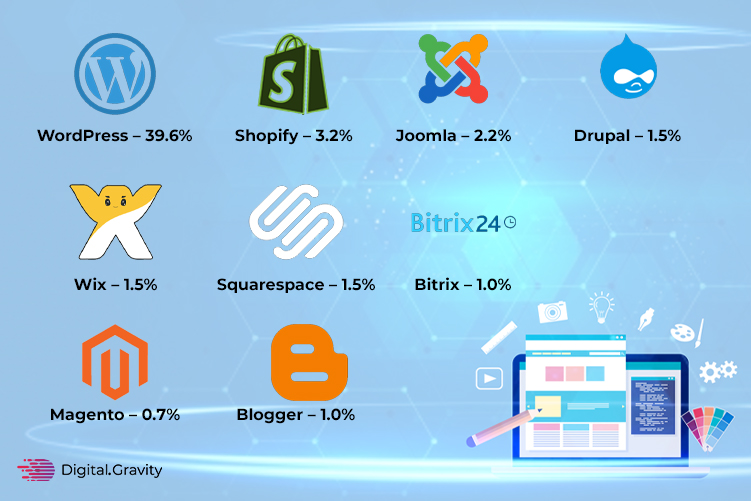Biggest Challenges with Using WordPress Themes in 2023
WordPress is an open-source, free CMS (content management system) written in PHP. It originally surfaced as a blogging platform and quickly rose in popularity for being the ultimate web solution it is today. Now choosing the web technology for web development is the biggest challenge itself , you can go with Laravel or WordPress. Both has its own vulnerabilities we will specifically talk about WordPress here.
In 2016 WordPress published over 117,939,148,357 words, and as we speak of 2021, WordPress powers over 39.5% of all the websites on the internet. Being the world’s fastest-growing CMS system.

WordPress has progressed exceptionally over the last decade, with several opportunities for customization offered through plugins and coding, SEO services, and a commendable reputation for blogging.
However, with all the benefits of WordPress comes a few disadvantages. Unfortunately, the CMS is subjected to malware, cyberattacks, speed issues, and other vulnerabilities. Security is a major concern with WordPress themes; stats show in 2019 alone, WordPress was accountable for 90% of hacked CMS platforms.
Whether you happen to be an experienced developer or a beginner using WordPress, fortunately, there are certain measures you can take that will help in protecting your WordPress themes. Here are some common issues in WordPress themes and how you can tackle them.
What is WordPress?
WordPress features include a plugin architecture and a template system that is widely known as WordPress themes helpful in customizing your website. From designing or changing the overall layout of your website, WordPress Themes has got you covered! Customization includes design elements such as color, typography, and more.
WordPress themes produce over 400 million views per month, mind websites with an aesthetic appeal will attract a larger audience to your sites. Therefore choosing the right theme and protecting it against any vulnerabilities is essential for every website.
Challenges and Weak Points of WordPress Themes?
-
Speed
There are plenty of reasons that contribute to the speed issues in a WordPress theme. The reasons will vary in every situation, from web hosting and running excessive background scripts to DDOS attacks and using unoptimized plugins and images. Not to mention, there are also slow WordPress themes available, and common errors such as using an outdated PHP version can affect the speed of your site. Failure to implement recommended practices like caching also results in the slower site activity.
However, what happens when you optimize everything yet still encounter speed issues? This means your hosting provider could be the problem in your WordPress theme.
-
Vulnerabilities
Cross-site scripting and SQL injection are some of the many unfortunate vulnerabilities of WordPress. These issues mainly stem from structural errors where the site may load malicious codes or insert SQL queries that use an input field or any other web form to destroy a database.
-
Security
According to stats, over 70% of WordPress installations are vulnerable to security breaches and hacker attacks. To power your WordPress theme, you will need themes and security plugins that are generally prone to various security vulnerabilities. This is why it requires constant updates and minimal user error. However, if these third-party elements aggravate, it may add to the vulnerability of your site.
-
Malware
WordPress themes are a common target of malware like SEO spam, unauthorized redirects, and cryptocurrency mining. A script, infected theme, or an outdated plugin injects the malicious code into your site, which not only steals data but inserts spiteful content that may not even be noticeable due to its hidden nature.
Malware can bring adverse consequences to your WordPress themes, and reinstallation may even be necessary to replenish the core. This can add up to your expenses in terms of large data storage transfer or hosting.
How to Select a Theme and Overcome these Challenges?
Selecting a theme that is visually appealing and ‘safe’ is vital to an effective website. A secure WordPress theme can save you from your site’s troubles being too outdated and vulnerable to malware and plugin conflicts.
You must select a theme that is free of security vulnerabilities, complies with code standards, is updated frequently, and compatible with all plugins and elements of your site. Be sure to use a theme check plugin for your site, which will carry out a test and notify you if the theme passed or failed based on an effective website’s criteria.
The Role of WordPress Plugins, Tools, and Themes
Plugins and themes can have an impact on the time your website takes to load. Using optimized, updated themes, effective tools, and trustworthy plugins from credible resources are recommended to protect your site.
Have your developer switch to a new provider or assess your website’s plugins by running tests and disabling each of them to identify the problem?
You may also use plugins and verified security tools to your advantage. These plugins block out the malicious activity and notify you of any issues you should be aware of. They fight off bugs and constantly work to protect your site from potential security breaches and malware attacks.
What you should keep in Mind while Customizing your WordPress Themes
- Use a secure password
- Download themes and plugins form trustworthy sites only
- Consistently scan your website to look out for potential security breaches
- Update your site’s element to stay safe from malware infections
- Back up your site regularly so you can restore it in case of any mishaps
- Scalability of your site
While you are ensuring your website’s safety with malware protection and custom codes, you need to be careful that these systems are not negatively impacting your scalability. A scalable site is essential to meet the criteria that drive high-traffic to your site. The trick to sufficient scalable hosting is to focus on factors like plugins, customizations, and themes.



